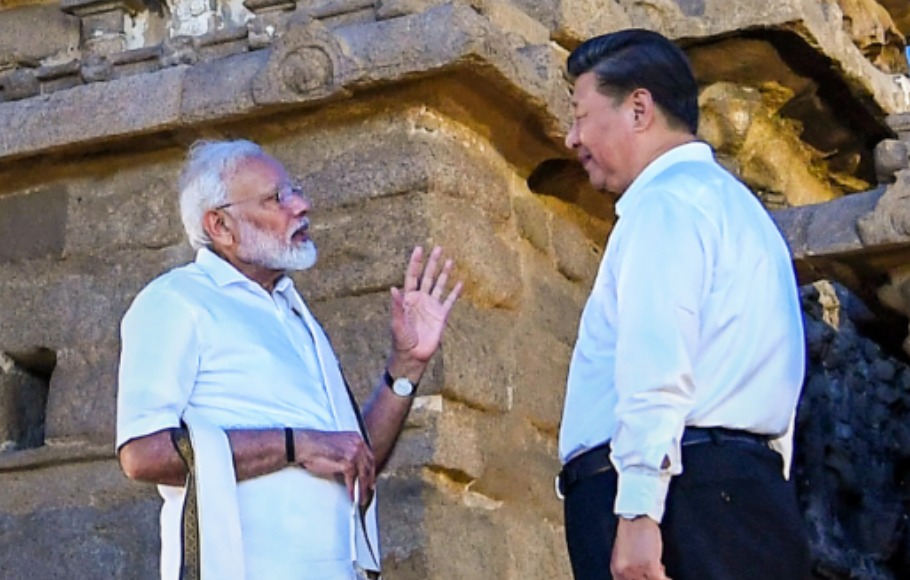
When at fault, Jinping, Modi both have someone else to take blame
Had the BJP managed to win, Shah would have been called the “Chanakya” of politics and the prime minister would have made many subtle appearances on TV, with the cadres chanting ‘Modi-Modi’ in the background. But, for the moment, the Jinpings have found their Keqiangs to deflect the blame.

Several years ago, Indian streets used to resonate with chants of Hindi-Chini bhai, bhai in deference to Jawaharlal Nehru’s romantic notions of the neighbour being our ally and friend. The then Indian prime minister’s romanticism led to a huge disaster in 1962 and ended the bon homie with China.
Several decades later, Prime Minister Narendra Modi has been trying to revive the feeling of solidarity with the Chinese by cosying up to their president Xi Jinping. In the process, his party has imbibed some of the characteristics of the Chinese style of leadership, as the aftermath of the debacle in Delhi suggests.
Jinping is under the cosh these days for demonstrating a style of leadership that has a simple philosophy: Take credit for every success, sacrifice someone else for failures. This criticism has gained acceptance due to Jinping’s inept handling of the coronavirus outbreak in China. The Chinese president, the fount of power in the country, has been missing from the frontlines — barring a brief appearance in a senitised setting — and has outsourced the task of leading the fight against the outbreak to prime minister Li Keqiang.
Related news: Modi, Xi ‘connect’ India, China beyond routine trade ties
To himself, Jinping has arrogated the role of issuing strict warnings, blaming other officials on the frontline and sacking them, and generally creating the impression, with the help of spin doctors, that the virus is raging across the mainland because of the incompetence of others. In China, not even the proverbial leaf shakes without Jinping’s permission or knowledge, but the party and media machinery is trying to shield him in a bid to ensure the supreme leader’s image of a man who could do no wrong is not sullied.
A similar strategy is at work in the BJP after the party’s decimation in the Delhi assembly polls. When the campaign was on, Union Home Minister Amit Shah, Uttar Pradesh Chief Minister Yogi Adityanath and Prime Minister Modi were at the forefront of the campaign. Now that the BJP has lost, the three leaders — and their consigliores of hate — have disappeared. On the chopping blocks are now the heads of the little-known-rarely-seen-never-heard party chief JP Nadda and that unfortunate man now ridiculed as ‘Rinkiya ke Papa’ — Manoj Tiwari.
During the campaign, Shah had addressed at least 50 rallies, went door-to-door seeking votes for the party and set the tone of the campaign with statements like “send a shock to Shaheen Bagh”. This line was corroborated by Adityanath who went to the ridiculous extent of equating biryani with religion and the prime minister who took a similar stand during his rallies in the final stage of the campaign.
Related news: Modi-Xi bonhomie at Mamallapuram sends out a positive message
Tiwari, whose eponymous Bhojpuri song has earned him that unfortunate sobriquet, was at best a token presence — either making outrageous claims of winning a clear majority or echoing the top leadership’s dog whistles of hate. Nadda, similarly, confined himself to small meetings primarily aimed at mobilising the cadre.
Since the day psephologists predicted a BJP drubbing on the basis of exit polls, Shah has not been seen in public talking about the election, or his claim of Delhi voters sending an electric shock to Shaheen Bagh. And BJP spokespersons are spending energy on TV channels to argue “the debacle is a collective failure of the party.”
Had the BJP managed to win, Shah would have been called the “Chanakya” of politics and the prime minister would have made many subtle appearances on TV, with the cadres chanting ‘Modi-Modi’ in the background. But, for the moment, the Jinpings have found their Keqiangs to deflect the blame.
Projecting Nadda and Tiwari — one a rubber stamp chief of the national unit, the other of the Delhi unit — is pure hogwash. In the BJP, nothing happens without the consent of the prime minister and the home minister. The prime minister usually provides the ideological outline and Shah fine-tunes the details and ensures its execution. Those who follow the BJP modus operandi know there is nothing Chanakya-ish about the BJP’s strategy.
Related news: Twitterati echo ‘GoBackModi’ in Mandarin, but ‘welcome’ Xi Jinping
The BJP’s strategy is rather based on a single idea — if the party is at the risk of losing, go back to polarisation, talk about Hindu, Muslim, Pakistan, kabristan, Eid, Diwali, biryani, poha or Shaheen Bagh. Sometimes it works — like in Uttar Pradesh and Assam — and sometimes it doesn’t, depending on the demography and the response of the opposition. But, regardless of the outcome, the Shah-Modi combine always tries some iteration of this polarisation formula.
Great leaders are the ones who share the credit and monopolise the blame. This reluctance to take the blame for a setback — a trademark of the Congress under the Gandhis — tells us the current BJP leadership may give the impression of being in control, but deep inside they fear being called out for their failures and fear any challenge to their control over the party.
Behind those angry faces and broad chests, lie normal human beings insecure about their own future. And it is not always the coronavirus that makes them so vulnerable.

